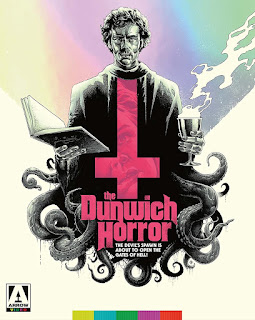The Dunwich Horror
The horror genre took a dramatic turn after the success of Rosemary's Baby (1968). Suddenly, castles, cobwebs and fangs were about as popular as three-day-old donuts. Which meant that adaptations of reliable literary authors like Edgar Allan Poe and H.P. Lovecraft needed a fast facelift before hitting theaters. And that's exactly what AIP attempted with this rather desperate psychedelic spin on The Dunwich Horror (1970).
Director Daniel Haller had already taken a semi-successful crack at Lovecraft once with 1965's Die Monster Die, so he probably seemed as good a choice as any to steer the story of yet another interdimensional incursion by the "Old Ones," this time invited into our world by one Wilbur Whateley (Dean Stockwell) who plans to supernaturally impregnate a naive college girl (Sandra Dee) with the help of the infamous Necronomicon. After stealing a copy from Miskatonic University, Wilbur heads back to the family farm; but his supernatural antics have attracted the attention of the suspicious townsfolk who suspect the Whateley's are up to no good again.
The Dunwich Horror faces the same challenge all Lovecraft adaptations come up against at some point: how does one create "indescribable evil" on a movie screen? In this case, Haller catches a break since the monster in question is invisible a great deal of the time, accomplished cinematically with a roving camera, wind machines and some solarized screen effects. But the film's suspense is based mostly on anticipation, which hits a wall when push comes to shove during the Raven-esque battle of wills finale.
Dean Stockwell (Quantum Leap) is genuinely unnerving as "weird" Wilbur - a role intended for Peter Fonda - but his hand-jive histrionics and slow motion groping of Sandra Dee's body-double are lame substitutes for actual thrills. Same goes for the film's body-paint orgy hallucinations, shot with a kooky wide angle lens covered in Vaseline, inserted for obvious counter-culture appeal. Haller's film feels more comfortable inside the Whateley's farm, which looks conspicuously like one of his old Corman-Poe sets. Ultimately, for all the movie gets right from a literary perspective, it gets just as much wrong by pandering to an audience that had probably already tuned out.
Previous released as part of a Blu-ray double-feature from Shout Factory, Arrow Video’s new 2K restoration is miles better in detail and color saturation. You’ve never seen sideburns and pancake make-up with this sort of clarity…in fact you’ll probably wish you hadn’t. The all-new extras are significant as well, including a lengthy two-hour plus Zoom conversation between film historians Stephen Bissette and Stephen Laws, sit-down interview with Lovecraft-inspired author Ruthanna Emrys, a featurette on the score and new audio commentary. The film itself might be only so-so, but the overall all package is way too good to pass up.




Comments
Post a Comment